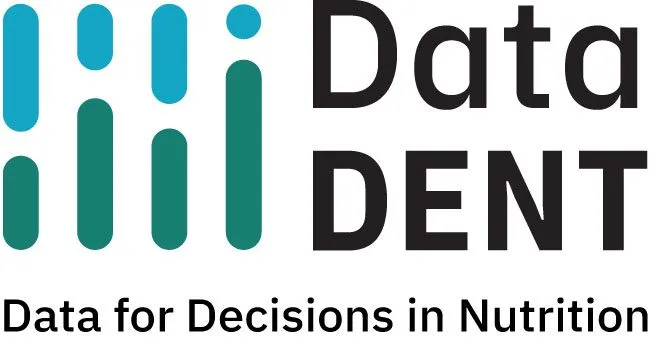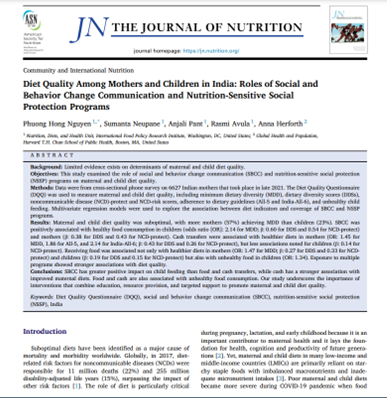Journal Article | https://doi.org/10.1016/j.tjnut.2024.07.026
Date of Publication | July 2024
Abstract:
Background: Limited evidence exists on determinants of maternal and child diet quality. Objectives: This study examined the role of social and behavior change communication (SBCC) and nutrition-sensitive social protection (NSSP) programs on maternal and child diet quality. Methods: Data were from cross-sectional phone survey on 6627 Indian mothers that took place in late 2021. The Diet Quality Questionnaire (DQQ) was used to measure maternal and child diet quality, including minimum dietary diversity (MDD), dietary diversity scores (DDSs), noncommunicable disease (NCD)-protect and NCD-risk scores, adherence to dietary guidelines (All-5 and India-All-6), and unhealthy child feeding. Multivariate regression models were used to explore the association between diet indicators and coverage of SBCC and NSSP programs. Results: Maternal and child diet quality was suboptimal, with more mothers (57%) achieving MDD than children (23%). SBCC was positively associated with healthy food consumption in children (odds ratio [OR]: 2.14 for MDD; β: 0.60 for DDS and 0.54 for NCD-protect) and mothers (β: 0.38 for DDS and 0.43 for NCD-protect). Cash transfers were associated with healthier diets in mothers (OR: 1.45 for MDD, 1.86 for All-5, and 2.14 for India-All-6; β: 0.43 for DDS and 0.26 for NCD-protect), but less associations noted for children (β: 0.14 for NCD-protect). Receiving food was associated not only with healthier diets in mothers (OR: 1.47 for MDD; β: 0.27 for DDS and 0.33 for NCDprotect) and children (β: 0.19 for DDS and 0.15 for NCD-protect) but also with unhealthy food in children (OR: 1.34). Exposure to multiple programs showed stronger associations with diet quality. Conclusions: SBCC has greater positive impact on child feeding than food and cash transfers, while cash has a stronger association with improved maternal diets. Food and cash are also associated with unhealthy food consumption. Our study underscores the importance of interventions that combine education, resource provision, and targeted support to promote maternal and child diet quality. Keywords: Diet Quality Questionnaire (DQQ), social and behavior change communication (SBCC), nutrition-sensitive social protection (NSSP), India

